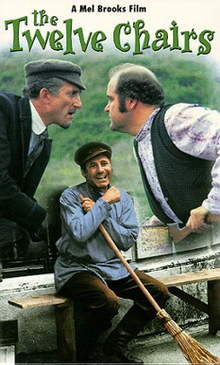The Twelve Chairs (1970 film)
| The Twelve Chairs | |
|---|---|

Fox VHS cover
|
|
| Directed by | Mel Brooks |
| Produced by | |
| Written by |
|
| Based on |
The Twelve Chairs by Ilf and Petrov |
| Starring | |
| Music by | John Morris |
| Cinematography | Djordje Nikolic |
| Edited by | Alan Heim |
| Distributed by | UMC (Universal Marion Corporation) Pictures (USA) Gaumont (France) |
|
Release date
|
|
|
Running time
|
93 minutes |
| Country | United States |
| Language | English |
The Twelve Chairs is a 1970 American comedy film directed by Mel Brooks, starring Frank Langella, Ron Moody, and Dom DeLuise. The screenplay was written by Brooks. The film was one of at least 18 of the Russian 1928 novel The Twelve Chairs by Ilf and Petrov.
In the Soviet Union in 1927, Ippolit Matveyevich Vorobyaninov (Ron Moody), an impoverished aristocrat from Imperial Russia now working as a local village bureaucrat, is summoned to the deathbed of his mother-in-law. She reveals before dying that a fortune in jewels had been hidden from the Bolsheviks by being sewn into the seat cushion of one of the twelve chairs from the family's dining room set. After hearing the dying woman's Confession, the Russian Orthodox priest Father Fyodor (Dom DeLuise), who had arrived to administer the Last Rites, decides to abandon the Church and attempt to steal the treasure for himself. Shortly afterwards in the town of Stargorod, where Vorobyaninov's former mansion is located, a homeless con-artist, Ostap Bender (Frank Langella), meets the dispossessed nobleman and manipulates his way into a partnership in his search for the family riches.
The chairs, along with all other private property, had been appropriated by the State after the Russian Revolution. Vorobyaninov and Bender set off together to locate the chairs and recover the fortune, but are stymied by a series of false leads and other trying events. They find that the chairs have been split up and sold individually. Therefore, their hunt requires a great deal of travel to track down and open up each piece of the set in order to eliminate it as a possible location of the booty. As they progress, they meet comrades from every walk of life in Soviet Russian society, transforming the film into a satirical sendup of failing Communism.
...
Wikipedia
